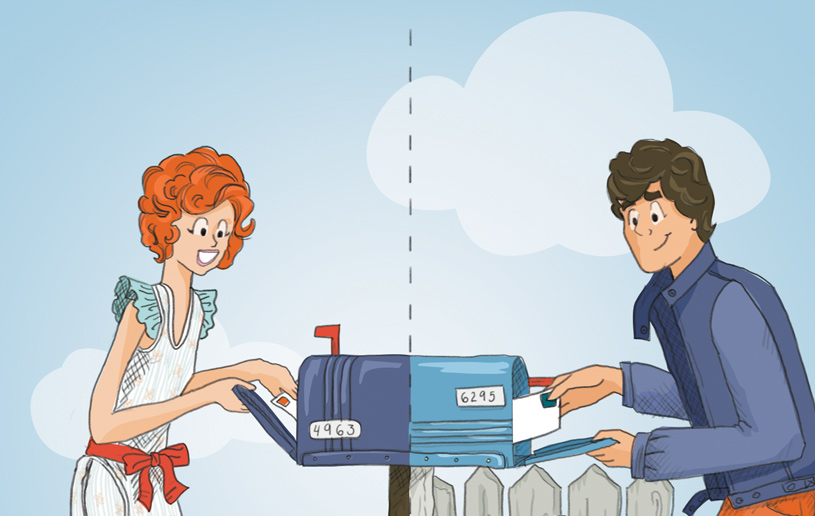
In first grade I received my very first letter. Seems the government mistakenly drafted me for the Vietnam War. Still it was nice to get a letter from someone.
When Ramona and I were dating, we lived in the same town yet wrote weekly letters, most of which we’ve kept to this day. They chronicle a thousand things we’d forgotten, and some we were glad to forget.
In those days I checked my mailbox eagerly. You never knew. One day an envelope arrived that said, “Caution: Snake Eggs.” When I slit the envelope, something sprang out at me. It was a paper clip wound with a rubber band, but I had the shakes for days. I married the girl who sent it to me, and there have been other surprises along the way. Most of them good ones.
I miss the concrete world of real mail. I’d settle for a paper cut to bring it back. Somewhere the world changed. Long distance rates plummeted, texting took off and nine out of every seven people bought cell phones. We’ve saved time, but I’m not sure we’ve redeemed it. I’m as guilty as the next guy. Email is efficient, but speed is not always commendable. I love the personal touch of a letter. A tangible reminder that someone thought enough of me to spend a whopping eight cents on a postage stamp.
Once I overheard my parents talking about a letter Dad had received. “Remember the Three Day Rule,” Mom said. I was curious about the rule. “When you write anything negative in a letter,” she told me, “you let it sit in a drawer for three days. Then read it again and decide whether you should fix it.”
Though I use email regularly, I’ve tried to abide by that rule. Twice I have sent things I wish I hadn’t: once it took a long trip to fix it, the other time a phone call. By its nature, email seems to fight our need to stop and contemplate what we are saying, to carefully consider our words. As a Christian, I am to be a person of the spoken and written word. Those words should build, nurture, encourage and affirm. None of these develop quickly.
A pastor told me that his church was split apart when emails—many containing gossip, slander and personal attacks against him—were forwarded around the world. I suggested he place this on his answering machine: “Hello, if you wish to criticize last Sunday’s sermon, press one. To gripe about the music, press two. If you have some encouragement, the pastor will be right with you.” Instead he included in the church bulletin some helpful rules for electronic communication:
- Never write anything you wouldn’t want the entire world to read.
- Never use email to confront, correct or confess. Do this in person. Don’t reply to such email. Ask for a personal meeting instead.
- Use email to exchange factual information or to send love, encouragement, and support.
- Let your speech be seasoned with love, grace, and salt.
Missionary friends in the Philippines once emailed to tell me that their son Kyle was seriously ill. The mother said he loved my books and asked if I’d be able to send him something from Canada. Flattery will get you everywhere, so I sent him a package: “Snake Eggs: Use Caution.” Not really. Instead, our family put together a small packet of goodies for him.
Six weeks later, to my delight, I unravelled a brown parcel secured by a thin red ribbon and festooned with bright blue Filipino stamps. Five packages fell out. Dried mangoes and pineapples labelled “To Die For.” Flavoured nuts ranging from “Mild” to “Mother-in-Law Hot Pepper.” Within minutes I wrote the following:
Dear Forest and Carol,
You won’t believe what arrived in my mailbox today. Wow! In moments like these I find being a Christian tough work. How I’d love to lock myself in a room somewhere and savour them all by myself. But I shall share. I promise. Thanks so much. You are wonderful. I am thrilled to hear that Kyle is doing better. Smack him between the shoulder blades for me! May the Lord continue to strengthen you as you serve Him there.
100,000 Blessings! Phil
May I suggest that you send such a note today? Email it if you must. But better yet, drop it in an envelope and send it off tomorrow. Just don’t try to mail it with an eight-cent stamp.

